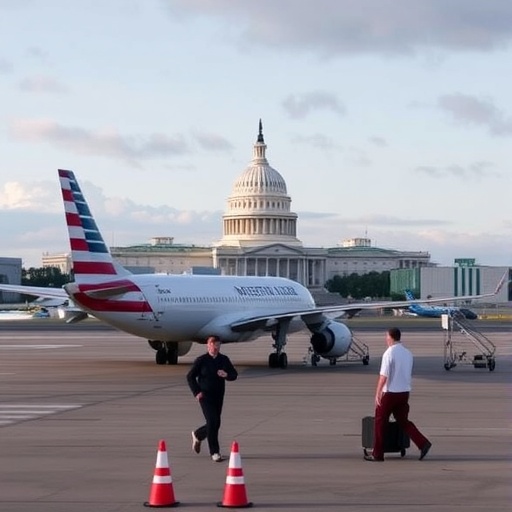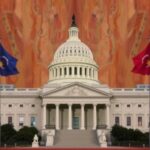Government Shutdown Sparks Nationwide Air travel Delays: Unpaid Federal Workers Ground Flights in Week Four
In a stunning escalation of the federal government’s ongoing shutdown, Air travel across the United States ground to a near halt this week, with thousands of flights delayed or canceled as unpaid federal workers at key transportation agencies walk off the job or operate at skeleton crews. As the shutdown enters its fourth week, families separated by holidays and businesses scrambling to meet deadlines are bearing the brunt of these disruptions, highlighting the human cost of political gridlock in Washington.
- TSA Lines Stretch into Hours as Unpaid Agents Call in Sick
- FAA Operations Falter: Air Traffic Controllers Face Burnout Amid Shutdown Chaos
- Stranded Families and Crippled Businesses: Personal Toll of Transportation Breakdown
- Economic Ripples: Shutdown’s Hidden Cost to Air Travel and Beyond
- Path to Recovery: Negotiations Heat Up as Air Travel Experts Demand Action
TSA Lines Stretch into Hours as Unpaid Agents Call in Sick
The Transportation Security Administration (TSA) is at the epicenter of the Air travel crisis, where unpaid federal workers are causing unprecedented delays at airport security checkpoints. Normally bustling terminals from New York’s JFK to Los Angeles International are now scenes of frustration, with wait times ballooning to over two hours in some cases. TSA screeners, who have been working without pay since the shutdown began, are increasingly calling in sick or simply not showing up, leaving understaffed lines that snake through airports like endless queues at a post-apocalyptic checkpoint.
According to TSA data released Friday, security wait times have increased by 45% nationwide compared to pre-shutdown levels, affecting over 2.5 million passengers daily. “It’s heartbreaking to see families missing flights because of this,” said TSA spokesperson Kelly Langford in a statement. “Our dedicated agents are doing their best under impossible circumstances, but without paychecks, morale is at an all-time low.”
In Chicago’s O’Hare International Airport, one of the busiest hubs, delays have led to a ripple effect: passengers missing connections and airlines scrambling to rebook. A viral video circulating on social media shows a mother with two young children in tears after waiting three hours only to be turned away from their gate. Federal workers, numbering around 50,000 in the TSA alone, are furloughed or working without compensation, exacerbating the transportation bottlenecks that define this shutdown’s impact on air travel.
Experts point to the psychological toll on these employees. “Unpaid federal workers are the backbone of our aviation security,” noted aviation analyst Dr. Elena Ramirez from the University of Maryland. “When they’re stretched thin, the entire system falters, turning routine trips into ordeals.” This isn’t just about delays; it’s a stark reminder of how the shutdown is forcing essential personnel to choose between duty and financial survival.
FAA Operations Falter: Air Traffic Controllers Face Burnout Amid Shutdown Chaos
Beyond the checkpoints, the Federal Aviation Administration (FAA) is grappling with its own shutdown-induced turmoil, as air traffic controllers—another cadre of unpaid federal workers—report soaring stress levels and operational errors. With over 14,000 controllers managing the skies, the agency has resorted to mandatory overtime and reduced staffing, leading to widespread flight delays and even temporary ground stops at major airports.
FAA statistics reveal that delays attributed to air traffic control issues have surged by 60% in the past week, stranding an estimated 150,000 passengers. At Atlanta’s Hartsfield-Jackson, the world’s busiest airport, a single morning saw 200 flights delayed by an average of 90 minutes due to controller shortages. “We’re flying blind here,” quipped one anonymous controller in an interview with CNN. “Without pay, some of us are just hanging on, but burnout is real. One mistake could be catastrophic.”
The shutdown has halted non-essential FAA services, including runway maintenance and safety inspections at smaller airports, compounding the delays. Transportation Secretary Elaine Chao warned in a congressional briefing that prolonged disruptions could lead to a “national transportation emergency.” Businesses reliant on just-in-time inventory, such as automotive manufacturers shipping parts via air, are reporting losses in the millions. For instance, Ford Motor Company disclosed a $5 million hit from delayed component deliveries, underscoring how federal workers’ plight is throttling the economy’s arteries.
Historical parallels are chilling: During the 2013 shutdown, similar FAA issues caused 20,000 delays over 16 days. This time, with the shutdown stretching into week four, the stakes are higher. Controllers, who earn a median salary of $130,000 but haven’t seen pay since December 22, are dipping into savings or relying on food banks, as reported by the National Air Traffic Controllers Association (NATCA). “This isn’t sustainable,” NATCA President Paul Rinaldi stated. “Air travel safety is compromised when our people can’t focus.”
Stranded Families and Crippled Businesses: Personal Toll of Transportation Breakdown
The human stories emerging from this air travel meltdown paint a vivid picture of devastation. In Denver, single father Marcus Hale missed his daughter’s Christmas recital after a four-hour delay turned into an overnight cancellation. “We planned this trip for months,” Hale told reporters at the gate. “Now, the shutdown has robbed us of family time, all because politicians can’t agree.” Such anecdotes are multiplying, with social media flooded by #ShutdownStranded hashtags sharing tales of woe.
Families aren’t the only victims; the business sector is reeling from these transportation disruptions. A survey by the U.S. Chamber of Commerce found that 70% of small businesses dependent on air travel report revenue dips of at least 20% due to delays. In the tech industry, Silicon Valley startups are delaying product launches as executives can’t make cross-country meetings. “Air travel is the lifeblood of American commerce,” said Chamber President Thomas Donohue. “This shutdown is choking it off, costing jobs and growth.”
Particularly hard-hit are perishable goods transporters. Florists in Miami, shipping roses for Valentine’s Day, face spoilage risks from grounded cargo flights. One supplier, Rosa Imports, lost $200,000 in inventory last week alone. Federal workers’ unpaid status is indirectly fueling this chaos, as understaffed agencies fail to process the necessary clearances for freight. In a broader sense, the shutdown’s delays are inflating costs: Airlines like Delta and United have added $100 million in extra fuel and crew expenses, which will likely pass to consumers via higher fares.
Regional impacts vary but are uniformly severe. In the Midwest, winter storms compound shutdown-related delays, stranding travelers in subzero temperatures. Southern hubs like Dallas-Fort Worth see business travelers opting for costly private jets, widening the inequality gap. Quotes from affected parties underscore the urgency: “This isn’t just inconvenience; it’s a breakdown of trust in our transportation system,” lamented travel blogger Sarah Kline, whose blog has chronicled over 500 personal delay stories.
Economic Ripples: Shutdown’s Hidden Cost to Air Travel and Beyond
The financial fallout from these air travel disruptions is mounting, with economists estimating a $1.2 billion daily hit to the U.S. economy from the shutdown’s transportation effects alone. Unpaid federal workers, numbering over 800,000 across agencies, are curtailing spending, further dampening demand for flights. The Airlines for America trade group reports a 15% drop in domestic bookings since the shutdown began, translating to 50,000 fewer seats filled daily.
Delving deeper, the International Air Transport Association (IATA) projects that prolonged delays could shave 0.5% off GDP growth in Q1 2024. Hospitality sectors adjacent to airports are suffering too: Hotels near major hubs like Orlando International report 30% occupancy drops as tourists reroute or cancel. “Every delayed flight means lost revenue for everyone in the chain,” explained IATA economist Brian Pearce.
Government data underscores the scale: The Bureau of Transportation Statistics logged 25,000 delays in the first three weeks of the shutdown, a 35% increase year-over-year. Federal workers in ancillary roles, such as customs officers at international gates, are slowing border crossings, deterring international business travel. A case in point: Boeing executives delayed a key deal signing in Seattle after a transatlantic flight was rerouted due to FAA constraints.
Mitigation efforts are underway but limited. Airlines are waiving change fees and offering meal vouchers, yet passenger satisfaction scores have plummeted to 2011 levels, per J.D. Power surveys. The shutdown’s drag on air travel is also straining ground transportation alternatives—Amtrak reports a 25% surge in bookings, leading to its own delays—but these can’t fully compensate for the speed and reach of flights.
Path to Recovery: Negotiations Heat Up as Air Travel Experts Demand Action
As the shutdown drags on, glimmers of hope emerge from Capitol Hill, where bipartisan talks on funding bills gained traction this weekend. House Speaker Nancy Pelosi indicated progress on a short-term resolution that could restore pay to federal workers and normalize transportation operations within days. “We can’t let air travel suffer any longer,” she said in a press conference. Analysts predict that if passed, flights could see relief by mid-week, though backlogs may persist for weeks.
Looking ahead, the FAA is preparing contingency plans, including voluntary overtime incentives once funding resumes. Transportation experts urge long-term reforms, such as automating more air traffic functions to reduce reliance on personnel during crises. “This shutdown has exposed vulnerabilities in our air travel infrastructure,” warned former FAA Administrator Randy Babbitt. “Investing in technology could prevent future delays from federal workers’ hardships.”
For passengers, practical advice abounds: Check flight statuses obsessively, build in buffer times, and consider travel insurance. Businesses are pivoting to virtual meetings, but the consensus is clear—restoring stability to air travel is paramount. As negotiations intensify, the nation watches, hoping for an end to the delays that have turned skies into a symbol of stalled progress. With federal workers poised to return to full strength, the promise of smoother transportation looms, but only if Washington delivers.








